Tideland (2005)
Directed by: Terry Gilliam
Written by: Mitch Cullin, Terry Gilliam, Tony Grisoni
Starring: Brendan Fletcher, Janet McTeer, Jeff Bridges, Jodelle Ferland
UK/ Canada
AVAILABLE ON BLU-RAY: NOW, from ARROW VIDEO
RUNNING TIME: 120 mins
REVIEWED BY: Dr Lenera, Official HCF Critic
Jeliza-Rose is the daughter of two drug addicted parents and copes with her miserable existence by living in a world that is half-real and half-fantasy. Her headless dolls have conversations with her, she imagines bog-men roaming around the house, and she dreams of living her life in Jutland. After mother OD’s, she and her father head out to a big house on the prairie which was once the property of Jeliza-Rose’s grandmother. But dad soon takes one “extended vacation” too many. Jeliza-Rose begins to imagine a neighbor to be a witch and the neighbor’s mentally challenged brother, Dickens, to be her husband.…
One of the first things I ever wrote for ‘Horror Cult Films’ was a run through of the films of one of my favourite film directors Terry Gilliam, and I intended to gradually expand the short reviews in the piece to full length ones, though so far that hasn’t come to be, and the only Gilliam film I did a write-up of since then was the rather disappointing [though what is really Brazil‘s little cousin it improves substantially with repeated viewings] The Zero Thereom when it came out in cinemas. Even though we already had a fine review of Tideland on the site from one of our ex-members, I jumped at the chance to look at the film again, partly because it’s one Gilliam film which I wasn’t sure that I actually liked very much – which of course is very different from saying that I didn’t think it was much good or that I didn’t admire it. I said this in my old article and am going to say it again – I believe the treatment of Tideland from distributors and especially critics [who at the least ought to have appreciated – even if they weren’t keen on – something from an artist with things to say who was expressing himself with no holding back, to be appalling. Maybe if it had not been in the English language they may have liked it more. Of course it’s proved to be a very divisive film with viewers, no less than Michael Palin telling Gilliam that the film was either the best thing he had ever done, or the worst – but that he couldn’t quite decide either way. I knew that I would find many things to praise in revisiting Gilliam’s harsh hymn to the resilience of children, but would I actually find it pleasurable to watch the thing?
It was based on a novel of the same title by Mitch Collin, and from what I gather, the screenplay by Gilliam and Tony Grisoni follows it quite well. It was made independently on a very small budget, and on a very tight schedule, while Gilliam was on a break from The Brothers Grimm. He’d just made it, but was quarreling with the Weinsteins over the final cut. Despite Tideland being low budget, Gilliam had trouble raising the money as so many people disliked the script, and most of it eventually came from Canada resulting in most of the cast and crew being Canadian, while the film was shot at the Canada Saskatchewan Production Studios, Regina, Saskatchewan, plus several Saskatchewan locations. Jodelle Ferland was chosen to play the lead with just five weeks left before shooting was intended to begin, while Brendan Fletcher was hired to play Dickens before Gilliam had ever met him. Gilliam had seen Fletcher’s work on tape, and had been impressed enough to cast him. Distribution was quite limited though oddly enough the film was both a critical and box office success in Japan. There was some controversy over the aspect ratio presented on the Region 1 DVD released by THINKFilm, which was 1.78:1, instead of the aspect ratio prepared and approved by Gilliam and Nicola Pecorini the director of photography for cinemas which was 2.35:1. Gilliam wanted to open up the image slightly for home video, but some other DVD releases contained the original aspect ratio including the UK one.
The voice of Jeliza-Rose opens the film along with a shot of corn billowing that goes from blue to a more natural yellow. We seem to be seeing a child totally happy at play as she sings and pretends to have conversations with her Barbie head finger puppets. She arrives at a ruined hut and talks to the fireflies in there before a train whizzes past and she loves the way it blows her around. However, this simple but rather idyllic existence is thrown into contrast when we flash back to Jeliza-Rose’s life some time before. She lives with her father and mother, but both of them are junkies and she even prepares their hits. We see mum express her love for her, then call her a bitch for trying to have some of her chocolate before crying “don’t ever leave me”. Meanwhile rock musician dad likes to wake her up at night to discuss things that are in books, and the two clearly have much more of a bond together. Her glimpse of the shadow of a ‘bog man’ after their conversation about one shows how a child’s mind works, but this child already seems to be numb from the misery surrounding her, and small wonder that she imagines that her toy heads talk to her. Already this is grim stuff, the only humour being when Jeliza-Rose asks her father to turn the light off because she’s scared, and father agrees to do so but then turns the light off anyway because he’s so wrecked. Mum is then found dead, but even more upsetting is that Jeliza-Rose seems incapable of grieving because she has to look after her dad. The two of them go to the countryside, the wide open spaces a considerable contrast from the messy interiors we’ve been spending time in, and dad can’t stop farting on the bus, but we’re not laughing, because we know that he’s deteriorating, and despite being played by Jeff Bridges [who then continues to play him as a corpse] it’s not much of a surprise when he dies – though Jeliza-Rose has grown accustomed to him being unconscious for long periods at a time. In fact she never even seems to acknowledge his death.
Lonely Jeliza-Rose relies more and more on playing with the likes of Mystique, Sateen Lips, Baby Blonde and Glitter Gal, the doll heads reflecting different aspects of her psyche. But she soon encounters her odd neighbours, Dell who’s blind in one eye from a bee sting and whom Jeliza-Rose initially thinks is a ghost, and her mentally impaired younger brother Dickens with whom Jeliza-Rose immediately becomes friends. Dickens once drove a school bus in front of an oncoming train, and keeps a stash of dynamite in his bedroom that he intends to use against the “Monster Shark” he believes is roaming the countryside. A connection with the past is gradually revealed, but Tideland only develops its slender story very slowly, much of the film given over to footage of Jeliza-Rose wandering about talking to her “friends”, which occasionally also include talking rabbits. And I don’t mean this to be meant as a negative criticism, though I know that some viewers find the film boring. Personally I would have been happy for even more scenes of this, what with Jodelle Farland’s incredible performance [what a shame she’s now not quite the star she deserves to be despite always being busy], the gorgeous yellow-emphasised cinematography of Pecorini which makes the yellow cornfields and the decrepit house the perfect places for a child’s imagination to run riot, and the surprisingly restrained evoking of Gilliam’s favourite theme of reality vs fantasy. Jeliza-Rose once imagines that the cornfields are underwater, but the low budget seems to hold Gilliam back from often doing this kind of thing.
The Alice In Wonderland references could have been dialed back a bit. They were deliberately increased by Gilliam to make the film a bit more palatable, though judging by its reception he failed to achieve that. There was some fuss made at the time about the way Jeliza-Rose is confronted with various unsavoury elements of life including drug addiction, madness and the physical reality of death, and Gilliam even shows, without really commenting on, a relationship that borders on being paedophilic [it’s probably worth noting that Gilliam doesn’t think it’s paedophilic at all, but one can’t help but think that way], not to mention a sordid back story of incest and child abuse. But I don’t feel that the film particularly exploits these ingredients, and the main interest is in the way that kids keep themselves sane through the most extreme circumstances with imagination and play, and through projecting their fears onto made-up characters. This film really shows an understanding of how children’s minds work. One moment I particularly like is when Jeliza-Rose, interested in reality for the first time in a while, returns from her first, none too friendly, visit to Dell’s house and makes out to her dolls [well, doll faces] that she actually had a wonderful time. There’s a wonderful shot here of the faces in close-up and by God we almost feel sorry for their abandonment. Throughout Gilliam piles on the Dutch angles, fish eye lens shots, split diopter shots [images in the background as clear as images in the foreground] and various other stylistic devices, while Pecorini mixes blue and red lighting during some of the climactic material, but all this never overwhelms things and it’s not as if they’re not appropriate. Tideland is certainly a good showcase for Gilliam’s skills as a director.
Even after this particular viewing, I remain of the opinion that Tideland is Gilliam’s most difficult film, and it’s hard to warm to, but I don’t think he made the film to automatically be liked anyway. Like many art house movies, he made it to be experienced, so that you’ll be thinking about it for days afterwards whatever your response to it is. And I will say that this time around the “happier” aspects of the story came to the fore rather more. After all, we witness a girl’s gradual transformation from someone who starts off numb and feeling almost nothing to someone who begins to become a more ‘normal’ human being. To me [others will disaagree], the ending is actually really positive and life-affirming, and reveals Tideland’s closest cousin to be Time Bandits [well, among Gilliam films- there also seem to be affinities with The Spirit Of The Beehive and Pan’s Labyrinth], where a child’s strange and often dangerous adventures prepare him/her for the real world. Gilliam has often lamented how sad it is that children these days read less and have less of an outlet for their imaginations, and I agree with him, so the film’s overall message can be seen as being certainly not a negative one. Let kids imagine all they want, and maybe let us adults do the same from time to time, even if reality will always have to be faced eventually. Tideland, one of Gilliam’s most personal works and certainly his most uncompromising, is ripe for critical re-evaluation.
Rating: 









The often yellow and brown-tinged Tideland gets a fine presentation on Blu-ray. In a way it’s a hard film to get to look really good, because of its employment of wide angle shots, odd framings, zoomed in shots, and the like which are things which can’t help but result in some flaws in the image, but the expected grain fluctuations as a result of this are very minor and certainly won’t distract. Sharpness and detail are generally first class.
Arrow have not seen to add any new special features, but then they didn’t need to because the DVD contained a first class selection in the first place and everything has been ported over. I’d seen them all when I bought the DVD, but decided to check them out again. I’d remembered the audio commentary from Gilliam and co-writer Tony Grisoni to be excellent as Gilliam commentaries tend to be, and indeed it was, providing so much information about the shooting of the film that you wonder why they bothered providing any other special features. My favourites included Gilliam pointing out when he just let Ferland be a child and do things and incorporated the results, mentioning his favourite cut [“it’s all downhill from now on”] and the two continually making jabs at the critics who complained about various things concerning the film. Gilliam is often sarcastic and understandably seems a little bitter, but does give some reasons as to why so many people didn’t like it and says how women seem to like and understand it more than men. He continually praises Ferland, but he also pretends that he’s never seen any Alfred Hitchcock films. Grisoni is sometimes reduced to being the “straight man” to Gilliam. Hugely informative but great fun too – a perfect example of an audio commentary.
The 43 minute documentary Getting Gilliam sees filmmaker Vincenzo Natali chart the filming of Tideland, and it’s quite wonderful. We see Gilliam falling asleep in the grass, and see him trying to keep his calm while dealing with delays the weather, an insect biting Jodelle and the lab losing some footage, but he also says he loved making this film, free from any interference, which makes it sad that it was received so poorly. Gilliam notes how on his more recent films he’s more interested in the actors [he loves improvisation] and a bit less on the visuals, and explains the meaning of the word “derivative” to Ferland by saying how Roland Emmerich steals all his shots from Steven Spielberg. Full of behind the scenes footage including the filming of some deleted material, it’s essential viewing not just for Gilliam fans but anyone interested in filmmaking. It’s followed by one of those fluffy, quick ‘making of’s that most films get, though there’s some nice shooting footage.
The four minute Green Screen shows how the major effects scenes were put together, and then we come to the Deleted Scenes, with a forced commentary by Gilliam. They include an extra bit with Jennifer Tilly as Jeliza-Rose’s mother showing how the doll heads were made, plus an interesting scene that in my view should have been left in as it shows Jeliza-Rose trying to deal with her father’s death. As I said earlier, in the film as it stands, one isn’t really aware that Jeliza-Rose is aware that her dad is dead. Sadly several other cut scenes, some of which we see glimpses of in the documentary, are not present. The fifteen minutes worth of interviews with Gilliam, producer Jeremy Thomas, Ferland,Bridges, and Tilly are often insightful though rather overly broken up – some answers seem to be cut short by the editing. Gilliam talks of something you don’t about very often – a showing of Tideland where a very large audience clapped after it had finished, while Thomas seems convinced that it will eventually find its audience like many of the films he’s made with directors he’s admired. I hope he’s right. The B-roll Footage, running 22 minutes, shows several scenes being set up and shot. It’s very interesting to watch and I loved how Ferland is carried all over the place. Overall a fine set of special features that only sometimes repeat themselves [notably the Gilliam interview].
Considering that even some Gilliam fans don’t seem to like Tideland, I might sound a bit mad recommending it, though I do ask that those people give it another go. Yes, it’s an often uncomfortable and unhappy watch, but it could also be one of Gilliam’s purest evocations of his favourite theme. I’m going to say to hell with it and urge newcomers to the film to dive straight in, because you’ll probably almost as likely to like it as dislike it. I hope my review has given some impression of what it’s like. Meanwhile fan of the film should most definitely buy Arrow’s release because its picture quality far exceeds that of the DVD and the often valuable extras are retained. So I guess I should say – Highly Recommended with Reservations!
SPECIAL EDITION CONTENTS
*High Definition Blu-ray (1080p) presentation
*DTS-HD MA 5.1 audio
*Optional English subtitles for the deaf and hard of hearing
*Commentary by writer-director Terry Gilliam and co-writer Tony Grisoni
*Introduction by director Terry Gilliam
*Getting Gilliam, a 45-minute documentary on the making of Tideland by Vincenzo Natali (Cube, Splice)
*The Making of Tideland featurette
*Filming Green Screen featurette with commentary by Gilliam
*Interviews with Terry Gilliam, producer Jeremy Thomas and actors Jeff Bridges, Jodelle Ferland and Jennifer Tilly
*Deleted scenes with commentary by Gilliam
*B-roll footage
*Gallery
*Theatrical trailer
*Reversible sleeve featuring two choices of original artwork
FIRST PRESSING ONLY: Illustrated collector’s booklet featuring new writing on the film by Neil Mitchell
Read Spaldron’s review of Tideland here: https://horrorcultfilms.co.uk/2011/05/tideland/

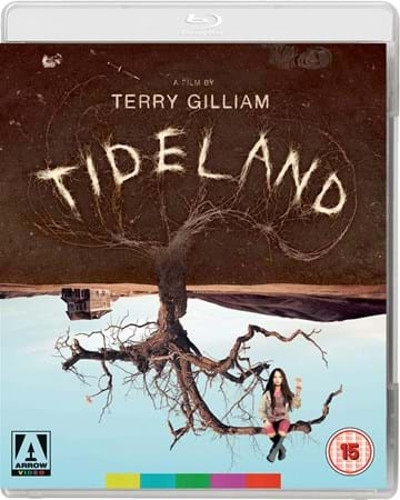
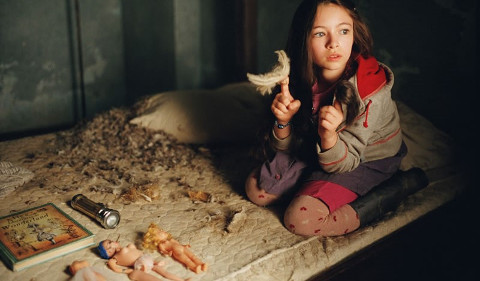
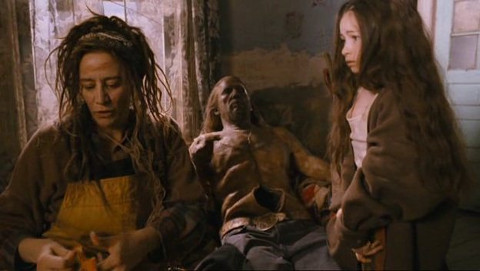

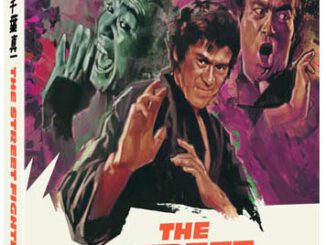
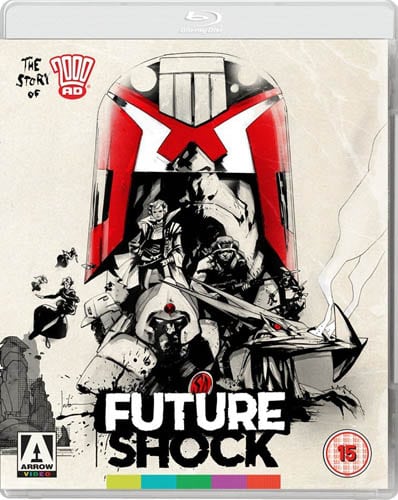

Be the first to comment